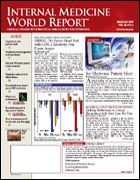Publication
Article
Internal Medicine World Report
Need a Diagnosis? Try Google
As more and more physicians and patients jump on the Google bandwagon looking for answers to difficult diagnostic questions, some experts have questioned whether the plethora of medical information produced by the search engine is, in fact, beneficial to the user.
A recent study published in the British Medical Journal (2006;333: 1143-1145) set out to answer the question, "How good is Google in helping doctors to reach the correct diagnosis?"
The study included 26 diagnostic cases published in the case records of the New England Journal of Medicine in 2005. Search terms for each case record were entered into the Google search engine, and the results were recorded. The 3 most prominent diagnoses that appeared to fit the symptoms and signs of the case report were then selected, and the results were compared with the correct diagnosis from the published data.
Google searches found the correct diagnosis in 15 (58%) cases. There were also some cases where Google gave the correct diagnosis (eg, extrinsic allergic alveolitis), but the results were not specific enough to be considered correct.
The investigators, led by Hangwi Tang, MB, BS, comment that Google searches might be more effective for medical conditions that have unique symptoms and signs that can be used as search terms; searches are less likely to be successful in complex diseases without specific symptoms, or in common diseases with unusual presentations.
Furthermore, the investigators note that "Google searches by a ?human expert' (doctor) have a better yield, as Google is exceedingly good at finding documents with co-occurrence of the signs/symptoms used as search terms, and human experts are efficient in selecting relevant documents."
In an accompanying editorial (page 1131), Martin Gardner, a research fellow at the University of Glasgow, Scotland, argues that Google should not be regarded as a conclusive diagnostic method because:
? The Google searches included in the study were not, in fact, simple, as the investigators used their expertise to choose the search terms.
? No diagnosis was actually made by Google; instead, it presented a set of documents ranked according to their relevance to the search terms.
In short, "the study shows that in a certain class of diagnostic challenges experts may gain an advantage by including a web search in their deliberations," he writes.






